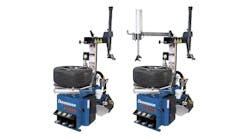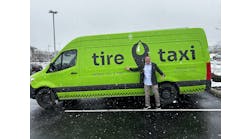The United States Department of Commerce hosted a government hearing on the Section 232 National Security Investigation of Imports of Automobiles and Automotive Parts on Thursday, July 19, 2018. One tire industry executive made sure his voice was heard.
Richard Smallwood, CEO and president of Sumitomo Rubber North America Inc. and an executive officer of its Japanese parent company, Sumitomo Rubber Industries Ltd., stood up for the tire industry by raising concerns about possible tariffs on foreign automobiles and auto parts.
According to a story appearing on the New York Times website the same day, Smallwood described himself as a "pretty far right-wing conservative" and a longtime supporter of President Donald Trump. "I'm somebody who believes in protecting America," he was also quoted as saying. At the same time, however, the story said Smallwood was "puzzled and dismayed" by the prosposal.
Here is his testimony at the hearing in its entirety, including background information.
"Good afternoon. I am Richard Smallwood, CEO and president of Sumitomo Rubber North America Inc. (SRNA), a subsidiary of Sumitomo Rubber Industries Ltd. (SRI), which is headquartered in Kobe, Japan. SRNA and Sumitomo Rubber USA LLC (SRUSA) -- Sumitomo Rubber’s U.S. manufacturing affiliate -- submitted joint comments for this investigation. SRI also filed a submission. Today, I plan to speak on behalf of all three Sumitomo Rubber entities. Sumitomo Rubber appreciates the opportunity to present our views at this hearing.
"Sumitomo Rubber is a global tire and rubber company that manufactures a wide range of automotive tires for all types of vehicles, including passenger cars, trucks, buses, and motorcycles. In the United States, Sumitomo Rubber’s tires are produced or imported and sold under the Dunlop, Falken and Sumitomo brand names.
"Sumitomo Rubber has already invested substantially in U.S. tire manufacturing, employing more than 1,600 American workers at our U.S. facilities in seven states. And we are now planning a substantial expansion of our U.S. manufacturing presence, having recently announced an investment of up to roughly $80 million that will permit SRUSA to produce 15,000 tires per day by 2020. These completed and future investments are part of a strategic plan announced two years ago, when Sumitomo Rubber made public its intention to more than double its American manufacturing output capabilities in the coming years.
"We believe that the imposition of tariffs on automotive parts under Section 232 would harm, rather than help, U.S. tire consuming industries and consumers, and would undermine the significant investments of Sumitomo Rubber in its U.S. manufacturing operations. The investments I just described reflect our strategy to be closer to the manufacturing facilities of our principal U.S. customers, including a range of automobile and motorcycle makers, as well as well-known automotive tire and parts retailers such as Discount Tire and Pep Boys. Indeed, we have transferred production capabilities for our products away from our non-U.S. operations to our American plants to better meet our customers’ needs.
"Tariffs on imported tires would have some combination of two adverse economic consequences. That is, they will increase the cost of these critical components to the U.S. automakers and retailers that the Sumitomo Rubber companies serve, or they will decrease the profit that we receive. To the extent we are able to pass on this increased cost, it will be absorbed by our direct customers, or be passed along in the form of higher sticker prices and higher retail product prices to the American consumer. Added tariff costs not passed on to our customers or to consumers will reduce the amount of funding available for us to invest in new production facilities or to hire additional personnel. Tariffs will therefore hurt our business and that of our customers, while also raising prices and potentially limiting choices for U.S. consumers.
"Sumitomo Rubber is not aware of any U.S. tire manufacturers advocating for the imposition of tariffs under Section 232, and no analysis from the U.S. government or any other entity demonstrating that U.S. tire imports threaten the national security. At the same time, the Department is hearing from many participants in the industry -- in their written submissions and at today’s hearing -- in detailed terms exactly how the imposition of tariffs would harm U.S. manufacturing and investment, just as these industries are completing their recovery from the Great Recession.
"Finally, alongside our expanding U.S. manufacturing operations, we do import tires from Thailand, Indonesia and Japan. These three countries are all close military allies and security partners of the United States, who contribute positively to U.S. national security in many ways that we described in our written submissions. Seen in its full strategic context, I just cannot see how Sumitomo Rubber’s engagement with the United States -- both through U.S. investment and imports -- could have any conceivable negative impact on U.S. national security. Certainly, our economic impact in the United States is a resoundingly positive one.
"On behalf of the Sumitomo Rubber entities, I again would like to thank the Commerce Department for the opportunity to share my testimony. Thank you."



